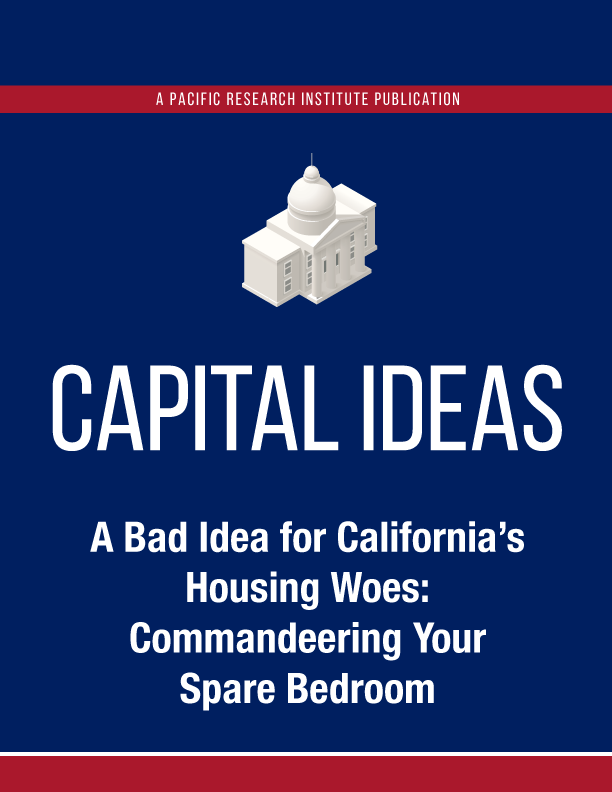A rather alarming idea for solving the United Kingdom’s housing crisis has been put forward in a recent study. Californians better hope the idea stays on that side of the Atlantic. If Sacramento or a city hall picks up on it, they might find themselves with unwanted “guests” in their spare bedrooms.
In “Fair decarbonisation of housing in the UK: A sufficiency approach” published by the Centre for Analysis of Social Exclusion in London, the authors address “a neglected aspect of the UK housing crisis: how to rapidly but fairly decarbonise the housing stock to meet tough net zero targets while meeting housing needs of the entire population.” They admit theirs is “a radical approach.”
Of course the plan is not to build more homes. That would defeat “decarbonization” efforts. No, these four academics “propose that rather than focusing on the supply of new homes, we look at the entire housing stock and how it is used,” one of the authors wrote in Medium. “Both in terms of carbon emissions and in terms of available space, the existing housing stock is vastly larger than any new construction.”
Their eyes are on “second and third spare bedrooms.” A dwelling is considered to be “under-occupied” if it has more than one spare bedroom.
“Based on this definition, we found that the English housing stock is large enough, by a significant margin, to meet the housing needs of England’s population.”
The authors don’t go far as to suggest that homeowners with spare bedrooms should be forced to take in tenants to fill those “under-occupied” spaces. Instead they recommend a tax regime and “regulation of second homes and excess housing” that will produce the outcomes they are looking for.
They also suggest “policies to better match housing stock and households” through “co-living,” and believe that “incentivising and enabling” empty-nest “households to move to smaller accommodation” is a necessary component in relieving Britain’s housing crunch.
They are careful to note that “it would be important to ensure that incentives to house-share do not encourage the involuntary household sharing common in our current housing system.” That’s thoughtful of them. There’s no guarantee, though, that policymakers would be equally as considerate in their application of the academics’ ideas.
Alarmingly, though, the authors recommend “compulsory purchase” for the “the public acquisition of housing assets that notably conflict with sufficiency objectives.”
They also make it clear that they want to place limits on how long people can own their own homes because, to their thinking, government would be a more appropriate custodian of the property, either through ownership or leases “to third parties with specific mandates to deliver, not houses, but housing policy goals.”
California doesn’t have an empty bedroom “problem.” In fact, the vacant bedroom rates in the state’s largest cities are among the lowest in the country. But there are already a number of tax regimes that are similar to an empty bedroom tax or surcharge.
San Francisco, for example, has a vacancy or empty homes tax, which went into effect on Jan. 1 after voters approved it in 2022. “Generally,” says the San Francisco Office of the Treasurer & Tax Collector, “it imposes a tax on keeping certain residential units vacant for more than 182 days in a calendar year,” with filing and payment beginning for most people in 2025. It has been challenged in court.
Oakland and Berkeley also have vacancy taxes and one has been proposed in South Lake Tahoe. Depending on the city, rates can be as high as $6,000 a year.
While not the same as an empty bedroom tax, there is a striking similarity. Beyond that, the existence of vacancy taxes shows that California policymakers are comfortable with violating property rights in the service of a hard-left agenda.
San Francisco Supervisor Dean Preston, the first Democratic Socialist elected to the San Francisco Board of Supervisors in more than 40 years, and the many others like him would likely find the British study to be a handy guidebook. In October 2022, just before Proposition M, the ballot measure that created the vacancy tax, was put before the voters, Preston said “it is a moral issue to have people living unhoused on the streets of our city and then have tens of thousands of units sitting empty.”
He might one day be referring to “bedrooms” rather than “units.”
Better that he refer to neither, though. Vacancy taxes have not had the effect that their architects have promised.
A vacancy tax enacted in 2017 Vancouver, British Columbia, did initially produce revenue that “exceeded expectations,” but it did not improve the city’s housing shortage. Bloomberg reported in 2021 that not only had the rental inventory in Vancouver not “budged,” there was no “compelling evidence” there nor in Melbourne, Australia, where the tax was “put in place” in 2018, “that homes have gotten any more affordable.”
Earlier this year, the Financial Post reported that vacant home taxes in Vancouver and Toronto “may be worsening the housing crisis.”
“Taxing residential property that isn’t used for a government-prescribed minimum number of days in a year is pernicious,” writes the Post’s Jack Mintz. While the taxes might be enacted “with the best of intentions,” they nevertheless “discourage long-run residential development” and “their effect will be the exact opposite of what their proponents intended.”
A vacancy tax also increases the chances the government will make a mistake that will cause homeowners bureaucratic headaches that can linger. In Toronto, the local media say “the city has received thousands of complaints on its online vacant home tax portal from Toronto residents who say they are living in the home they’ve been charged the levy for.”
If the government can make mistakes misclassifying entire homes, imagine how many it will make when it has to calculate the proper number of spare bedrooms a house has.
In every instance housing shortages can be resolved by allowing the market to work. But market solutions always seem to be off-limits wherever housing crises exist. Policymakers would rather use the means of government to achieve their ends, and if that includes putting homeowners in a position in which they have to take in strangers, then that’s just the way it is.
Kerry Jackson is the William Clement Fellow in California Reform at the Pacific Research Institute.


